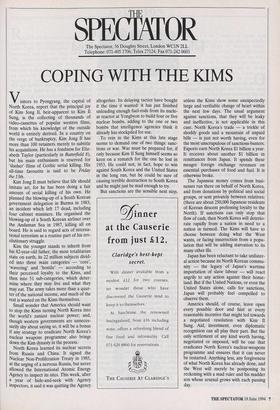SPECTATOR
The Spectator, 56 Doughty Street, London WC1N 2LL Telephone: 071-405 1706; Telex 27124; Fax 071-242 0603
COPING WITH THE KIMS
Visitors to Pyongyang, the capital of North Korea, report that the principal joy of Kim Jong II, heir-apparent to Kim II Sung, is the collecting of thousands of video-cassettes of popular western films, from which his knowledge of the outside world is entirely derived. In a country on the verge of bankruptcy, Kim Jong II has more than 100 retainers merely to subtitle his acquisitions. He has a fondness for Eliz- abeth Taylor (particularly in Butterfield 8), but his main enthusiasm is reserved for `slasher' films of Gothic serial killing. His all-time favourite is said to be Friday the 13th.
Kim Jong Il must believe that life should imitate art, for he has been doing a fair amount of serial killing of his own. He planned the blowing-up of a South Korean government delegation in Burma in 1983, an incident which left 17 dead, including four cabinet ministers. He organised the blowing-up of a South Korean airliner over the Andaman Sea in 1987, killing all on board. He is said to regard acts of interna- tional terrorism as a routine part of his rev- olutionary struggle.
Kim the younger stands to inherit from his 82-year-old father, the most totalitarian state on earth, its 22 million subjects divid- ed into three main categories — 'core', `wavering' and 'hostile' — according to their perceived loyalty to the Kims, and then into 51 sub-categories, which deter- mine where they may live and what they may eat. The army takes more than a quar- ter of the national income, and much of the rest is wasted on the Kims themselves.
Small wonder that America should want to stop the Kims turning North Korea into the world's zaniest nuclear power; and, though western governments are unneces- sarily shy about saying so, it will be a bonus if any strategy to eradicate North Korea's nuclear weapons programme also brings down the Kim dynasty in the process.
North Korea learned its nuclear secrets from Russia and China. It signed the Nuclear Non-Proliferation Treaty in 1985, at the urging of a nervous Russia, but never allowed the International Atomic Energy Agency to inspect its sites. This week, after a year of hide-and-seek with Agency inspectors, it said it was quitting the Agency altogether. Its delaying tactics have bought it the time it wanted: it has just finished unloading enough fuel-rods from its nucle- ar reactor at Yongbyon to build four or five nuclear bombs, adding to the one or two bombs that intelligence agencies think it already has stockpiled for use.
To rein in the Kims at this late stage seems to demand one of two things: sanc- tions or war. War must be prepared for, if only because Kim II Sung himself seems so keen on a rematch for the one he lost in 1953. He could not, in fact, hope to win against South Korea and the United States in the long run, but he could be sure of causing terrible destruction to South Korea and he might just be mad enough to try.
But sanctions are the sensible next step, unless the Kims show some unexpectedly large and verifiable change of heart within the next few days. The usual argument against sanctions, that they will be leaky and ineffective, is not applicable in this case. North Korea's trade — a trickle of shoddy goods and a mountain of unpaid bills — is just not worth having, even for the most unscrupulous of sanctions-busters. Exports earn North Korea $1 billion a year. It receives about another $1 billion in remittances from Japan. It spends these meagre foreign exchange revenues on essential purchases of food and fuel. It is otherwise broke.
The Japanese money comes from busi- nesses run there on behalf of North Korea, and from donations by political and social groups, or sent privately between relatives; (there are about 250,000 Japanese residents of Korean descent professing loyalty to the North). If sanctions can only stop that flow of cash, then North Korea will deterio- rate rapidly from a nation in need to a nation in turmoil. The Kims will have to choose between doing what the West wants, or facing insurrection from a popu- lation that will be adding starvation to its many other ills.
Japan has been reluctant to take unilater- al action because its North Korean commu- nity — the legacy of Japan's wartime importation of slave labour — will react angrily to any action against their home- land. But if the United Nations, or even the United States alone, calls for sanctions, Japan will probably feel compelled to observe them.
America should, of course, leave open every possible door and hint at every reasonable incentive that might led towards a negotiated resolution with Kim Il Sung. Aid, investment, even diplomatic recognition can all play their part. But the only settlement of any kind worth having, negotiated or imposed, will be one that eradicates North Korea's nuclear-weapons programme and ensures that it can never be restarted. Anything less, any forgiveness of what North Korea has already done, and the West will merely be postponing its reckoning with a mad ruler and his madder son whose arsenal grows with each passing day.


























































 Previous page
Previous page